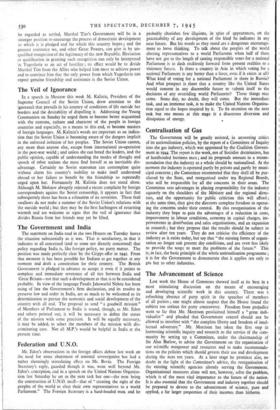Federation and U.N.O.
Mr. Eden's observations in the foreign affairs debate last week on the need for some abatement of national sovereignties has had a rather alarmingly stimulating effect on Mr. Bevin. The Foreign Secretary's reply, guarded though it was, went well beyond Mr. Eden's conception, and in a speech on the United Nations Organisa- tion last Saturday he set as the next task but one—the next being the construction of U.N.O. itself—that of "creating the right of the peoples of the world to elect their own representatives to a world Parliament." The Foreign Secretary is a hard-headed man and he probably cherishes few illusions, in spite of appearances, on the practicability of any development of the kind he indicates in any near future. But his words as they stand are a dangerous encourage- ment to loose thinking. To talk about the peoples of the world electing representatives to a world Parliament when half of them have not got to the length of casting responsible votes for a national Parliament is to dash recklessly forward from present realities to a visionary future. Is there a country in Asia in which voting for a national Parliament is any better than a farce, even if it exists at all? What kind of voting for a national Parliament is there in Russia? And what prospect is _there that a country like the United States would consent in any discernible future to rubmit itself to the decisions of any overriding world Parliament? These things may come. Some day, no doubt, they will come. But the immediate task, and an immense task, is to make the United Nations Organisa- tion equal to the hopes inspired by it. To fix attention on the next task but one means at this stage is a disastrous diversion and dissipation of energy.






























 Previous page
Previous page